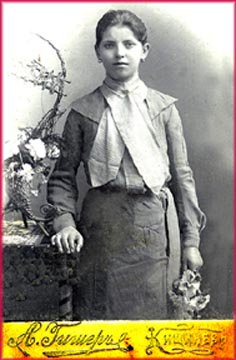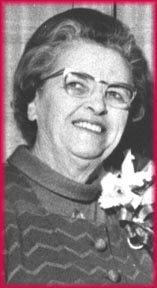


CHAIKA WAXMAN (Ida Waxman-Einbinder Wiesenthal), born in Kalarash in 1892, was the
daughter of Beyla Cohen and Jacob Waxman and the stepdaughter of Joseph Einbinder.
This photograph of her was taken in Kishinev, after the 1905 Kalarash pogrom.
What shall I tell you about Kalarash? It wasn't a big town. It was a small town, only with three streets, that's all it had. But those streets were as long as from one end of the town to the other. We had a nice house. We had three bedrooms, a living room and a floor, a wooden floor. Most of the houses there had earth floors, but our house had boards. There was a shul and in the shul my [maternal] grandfather Joseph Cohen was the president there.
My Grandmother Cohen was strictly kosher. She was very, very religious. She was president of our shulís women's group. Before everybody used to go home from the shul, she used to clean up. She had another woman with her and they cleaned it up nicely and filled up the shisseluch [little bowls] with water, that when they leave from the service, so they just dip their fingers in them and make the blessing.
For shabbas, she prepared those things should be properly put on the tables and the candles should be put on the table and before they go home there should be cake and wine in the shul. In the house she had a regular dinner with all the trimmings. What is a regular dinner? Chicken and soup and knaidlach and malai -- I don't know if you know what malai means, from corn meal, they used to make malai -- and she used to make knishes, potato knishes, kasha knishes. She was a very very good cook. From everything that she had she could make something.
In Kalarash, there was a Jewish school, a school where they learned Hebrew and there was a school where they learned Russian. And there also was a school where they learned both, Hebrew and Russian. So there were three kinds of different schools. The girls went to school too. I went to the Russian school. I still can speak a little Russian. But we didnít speak Russian in the house Ė we spoke Jewish [Yiddish]. Thatís my language.
My father Jacob Waxman, he should rest in peace, he wasn't so religious. He was more of a free man. He said this was foolish, to go to synagogue, standing and shokeling [to sway while praying]. But he was an honest man, he was a fine man. He was a carpenter, not an ordinary carpenter. He used to make fine furniture, like breakfronts, not plain things. He used to have working men work for him. He had a little store in Kalarash and that was the business.
My mother Beyla and my father, their marriage was arranged. They couldn't agree together because he wanted to go to America and she didnít, so they divorced and he went to America. First he went to America and he didn't like it there and he came back to Kalarash. And he stayed about another year in Kalarash and he said to himself that he was very, very foolish for coming back. It was so good over there in America and they didn't have to go to shuls, nothing. He was not a religious man, so for him it was good, America, because America was very free. Nobody went to shul, nobody did anything. They were so free, on shabbas they rode.

My father realized there is no life in Kalarash. There was nothing there except dirt and more dirt. He said that when he was in America, he forgot about how much dirt there was in Kalarash. When it rained, you had to go in boots, mud up till here. And you step into it, when you want to walk out, you took out your foot and the boot remained there in the mud. I didn't like it there in Kalarash either, so when my father sent for me, I went to America.
IDA WAXMAN-EINBINDER WIESENTHAL
(New York, 1967)